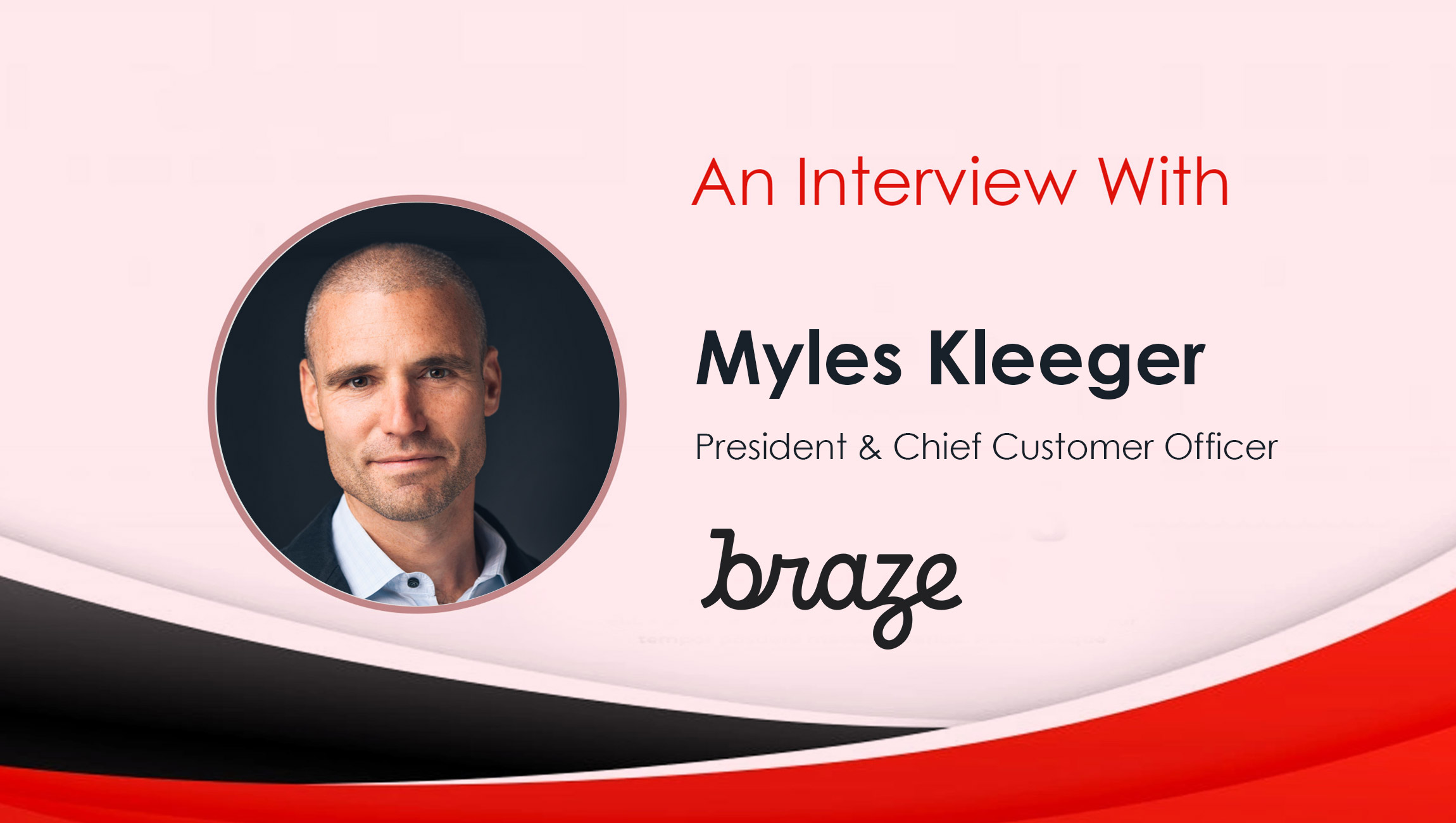Myles Kleeger, President & Chief Customer Officer at Braze chats about a few top customer engagement trends and practices in this Q&A with MarTech Series:
_________
Welcome to this MarTech Series chat Myles, tell us about your role and time at Braze and how that’s been going through these years?
I first joined Braze in December 2014, when I served as the company’s original Chief Revenue Officer. In 2018, I took on my current role as President and Chief Customer Officer. In this role, I’m responsible for managing all customer and partner-facing activities for the business. Since joining, it’s been exciting to support Braze’s rapid growth and work directly with customers – including household brand names across verticals including retail, financial services, entertainment, food/delivery and health/wellness – to maximize their customer engagement efforts across digital touchpoints.
We’d love to hear more about Braze’s Customer Engagement Review report and the key takeaways?
Our Customer Engagement Review is a state of the industry report – analyzing how customer engagement has evolved in the last year, and opportunities for improvement and growth in the year ahead. This is the second year we launched this report, which was developed through a combination of different sources, including Braze platform data, results from a global survey of over 1,500 marketing decision makers and insights from our Braze Customer Engagement Index.
Marketing Technology News: MarTech Interview with Greg Hanover, CEO at Liveops
A few major highlights from this year’s report show:
- Customer engagement is improving and it’s paying off: Report findings show an increase in brand confidence in their customer engagement efforts, with 94% of companies ranking their customer engagement as “excellent/good” vs. only 88% last year. Additionally, there continues to be a correlation between the level of customer engagement a brand provides and revenue. Of the companies that ranked their customer engagement as “excellent/good,” 98% exceeded their revenue targets. Of those that didn’t, only 65% met their revenue goals.
- Retention is a top priority: A focus on retention isn’t new, but in the past, brands tended to devote more energy and marketing resources to acquisition and top-of-funnel growth. This dynamic is changing, as shown by the 30% increase in brands allocating 51-75% of their budget for retention compared to last year.
- Untapped potential of anonymous users: Braze’s data shows users who take action on websites without logging in, opt to “continue as guest,” or who haven’t been given an official identifier made up 57% of new users in 2021. In 2021, 80% of these anonymous users received no messages from brands – marking an untapped audience. By engaging with these users on just one channel, brands can increase their likelihood to make a repeat purchase by 64%.
- The power of cross-channel: Companies that leverage a cross-channel approach to customer engagement continue to see top results. This year, a cross channel engagement strategy that combines both in-product messages and out of product messages increased a user’s likelihood to buy by 3.1X compared to a single-channel approach. On average, each additional channel added to a company’s messaging mix results in 4.3x more purchases per user and a 2.8x lift in likelihood to buy.
As data trends and data privacy practices evolve in this segment, how can marketers keep up with improved processes and martech?
Today, changes in the data landscape have forced brands to reduce reliance on third-party data – creating new challenges for achieving impactful, relevant experiences and elevating the importance of building first-party relationships that are grounded in first-party data. At the same time, the bar for consumer expectations is at an all-time high – they want real-time, personalized communication, in a way that feels relevant and human.
To accommodate these changes, our report shows 96% of brands plan to increase their marketing budgets, 42% plan to boost how many channels they use, and 38% of companies plan to place a heavier emphasis on zero-party and first-party data to continue to target and engage audiences. From a technology perspective, marketers must also ensure there’s data agility across their stacks. When all systems can communicate effectively and in real time, you can avoid the silos and reliance on batched data that leads to frustrating, outdated consumer experiences.
The continued move toward zero-and first-party data will push innovation in digital marketing by challenging marketers to rethink how to maintain direct relationships with their consumers through highly personalized, relevant communications, while putting more control in the hands of consumers regarding how they engage with brands.
What are some factors that will be crucial to driving a solid customer engagement process through 2022?
A solid customer engagement strategy must involve establishing personal connections and providing seamless communications across platforms for customers. The bar for consumer expectations is at an all-time high, so brands that fail in these areas risk falling behind competitors. While Braze’s Customer Engagement Review report found that companies are increasingly confident in their customer engagement – 94% rank their customer engagement as “excellent/good” vs. only 88% a year ago –, ongoing market changes, shifting consumer demand and updated privacy regulations will continue to be a challenge for brands. Therefore, brands must leverage customer engagement technology powered by live first-party customer data to listen to customers’ needs and respond quickly, personally and effectively.
We’d love to hear a few thoughts on your views on the global martech industry and predictions for 2022!
Over the last few years, many businesses have been laser-focused on digital-first or digital-only customer experiences. As many of these processes have become more established and integrated into a “new normal,” now there is an increased focus on investing in customer experience as a whole, across channels and platforms. This becomes even more critical as the world continues to re-open. As such, marketing budgets are expected to increase in 2022, with an emphasis on investment in customer engagement tools that can connect experiences, channels and platforms more seamlessly. For example, according to Braze’s Customer Engagement Review findings, 39% of US-based companies are planning to increase investment in customer engagement in 2022.
This increased budget will enable organizations to break down silos of engagement, and reevaluate the efficacy of spend on new acquisition, with an eye on activation, monetization, and long-term retention. Companies will need to analyze the real impact of digital investments that they’ve made over the past few years. Many will find that investments which appeared to work well may yield diminishing returns moving forward in the wake of the changes in the data privacy landscape and the ongoing evolution of consumer behavior. Marketers are accountable for outcomes that can be directly tied to revenue, so it is business-critical that marketing decision makers implement coordinated, cross-channel customer engagement strategies to emerge on top this year.
Some last thoughts, takeaways, digital marketing and martech thoughts, tips and best practices before we wrap up!
With more data available than ever before, the task of turning insights into cohesive marketing strategies can be overwhelming. Our report found that the number one concern (32%) for brands in 2022 was collecting, integrating and managing data. Organizations can meet this challenge by ensuring there’s streaming data and data agility across their tech stack. AI and other forms of automation can also enable marketers to operationalize data and corresponding insights to make better decisions and create more personalized experiences, ultimately delivering more business value.
As marketing gets more personalized and data driven, automation and AI are increasingly essential to delivering messages that resonate with consumers at scale. AI is not a silver bullet for all marketing challenges, nor will it be a threat to people’s jobs. The point of leveraging marketing AI is to unlock the power of your data at scale, and provide a significant, tangible lift to customer engagement efforts, while improving operational efficiency. This allows humans to spend more time focusing on what they do best; building great brands and developing great strategies and creative ideas. So, before companies invest in AI solutions, they must evaluate their strategies and identify where AI can augment and add the most value to the work being done by human teams.
Marketing Technology News: MarTech Interview with Jeff Fagel, CMO at MadHive

Braze (Nasdaq: BRZE) is a leading comprehensive customer engagement platform that powers interactions between consumers and brands they love.
Myles Kleeger is the President & Chief Customer Officer at Braze.
Missed The Latest Episode of The SalesStar Podcast? Have a quick listen here!
Episode 115: Direct Mail and its Impact on B2B Marketing: with Kris Rudeegraap, CEO and co-founder of Sendoso
Episode 114: Marketing Do’s and Don’ts with Chris McLaughlin, Chief Marketing Officer at LumApps
Episode 113: Optimizing B2B Sales Training Efforts: with John Elsey, CEO at Richardson Sales











